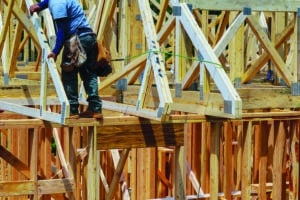Gov. Maura Healey will file long-promised legislation in March to create a standalone housing secretariat in her executive branch, and the head of that proposed office is not likely to start their work until “closer to the fiscal year” that starts July 1, Lt. Gov. Kim Driscoll said Tuesday.
Driscoll, whom Healey tapped last month to lead a working group that will examine how to structure the housing department she wants to spin off from the combined Executive Office of Housing and Economic Development, told municipal leaders she expects the impetus will shift to lawmakers by next month.
“This will be filed in March, and it does require legislative approval. So it’ll probably be closer to the fiscal year, we hope a little bit before, when we actually are in a position to have a new housing secretary, but it’s a key priority,” Driscoll told the Local Government Advisory Commission. “We think it’s certainly going to be a chief reason we’re going to be able to meet or hopefully close the gap on the 200,000 housing units that we are short in Massachusetts.”
Healey pledged on the campaign trail to split the housing and economic development secretariat into two different departments, then said in her inaugural address she would file a bill to do so within her first 100 days, which set a self-imposed target of April 15. Last month, Healey formed a working group to explore the idea in more depth.
While residents struggle under skyrocketing rents and mortgages and business leaders warn the strain is making Massachusetts a less desirable place to live, Driscoll said addressing the housing crisis is “such an important part of our work ahead.”
“The last year spent campaigning, we heard every place we went, even in places where housing is more affordable than greater Boston, that it’s still not affordable to community members there,” Driscoll said. “We know it’s a key piece of what may end up making Massachusetts not as competitive when it comes to some of the things that we do so well in places like life sciences and emerging technologies and clean tech and advanced manufacturing if people can’t afford to live here. We know it’s had an immediate impact on service workers in the hospitality and tourism industry and their ability to have the staff they need to rebound as we come out of COVID.”







